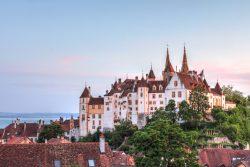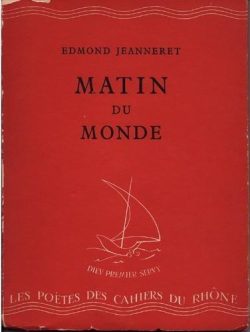Edmond Jeanneret (1914-1990)
Edmond Jeanneret was a pastor in the Reformed Church of Neuchâtel and particularly ministered in Leysin and Bôle. He was a theologian, a reader of Karl Barth and Dietrich Bonhoeffer, and a poet. He was especially fond of the reformed poets of the Renaissance era, but he also referred to Dostoievski, Paul Valéry and Saint-John Perse.
Ministry in the Swiss Canton of Vaud
Edmond Jeanneret was born on 1 August 1914 into a clock-makers’ family in Val-de-Travers. He studied literature and then theology in Lausanne, Basel and Paris during which time he met Pierre Maury and through him he discovered the works of Karl Barth and through the students’ federation, those of Roger Breuil (Jézéquel), Roland de Pury, and also read Dostoievski and Leon Chestov.
He married Lore Marks, of Jewish German extraction. During his first ministry in Lausanne, this passionate man made friends with the poet Edmond-Henri Crisinel, the painter René Auberjonois, and the composer Bernard Reichel. From time to time he also had fierce and strained confrontations with Charles-Ferdinand Ramuz which affected him deeply. During the war, he continued his ministry at the sanatorium in Leysin. He discussed with patients from all over Europe current questions and worries concerning the threat of Nazism and a worldwide conflict ; there was often a common interest in Karl Barth : his theology, his sympathy with the resistance to Nazism. He published his first collected poems Comme dans un miroir (As in a Mirror) in 1942, in the red series of the Cahiers du Rhône (Rhône collections), a magazine edited by Albert Beguin in Neuchâtel (published by Baconnière) to enable French-speaking members of the Resistance to express themselves.
After the war he continued his ministry in Geneva and Bôle, and published collected poems in the Cahiers du Rhône entitled Le Soupir de la creation (Creation’s Sigh) in 1947, Matin du Monde (Morning of the World) in 1953, les Rideaux d’environs (The Curtains Around) in 1961, an essay on Calderón’s plays, and a sermon compilation entitled la Faiblesse de Dieu (God’s Weakness) Taizé publishing 1967. His wife introduced the works of Dietrich Bonhoeffer to French-speaking countries. Particularly, she translated Eberhard Bethge’s edition of Résistance et soumission (Resistance and submission).
In 1979 he retired to Gorgier but remained committed to writing and working enthusiastically despite his rather poor health. He died in 1990.
The poet
Edmond Jeanneret’s interest in poetry and his calling as a pastor were closely linked. In the beginning it was a great, almost insurmountable, challenge : does not the language in the psalms deter those who strive to mimic it ? Little by little he began to understand, as he confided to his lady-pastor friend Suzanne Schell-Chausse, that “poetic inspiration is supremely free and its source and aim remain a mystery”.
A ceux qui chantent tes louanges,
Ton visage est leur ciel, leur chant ton giron ;
Abrités de tes mains, les rideaux d’environ
Sont les camps de tes anges
(To those who sing your your praises
your face is their skies, their song your bosom
Sheltered by your hands, curtains around
Are the camps of your angels)
Agrippa d’Aubigné
Reading Reformed poets of the Renaissance era, such as Agrippa d’Aubigné from Bartas, Jean Ogier from Gombauld, as well as poems by Laurent Drolincourt definitely helped him find himself. Then he considered that “The poet must transmit something stronger than himself and a poem must naturally be a celebration, a praise.”
Thus the collected poems entitled Matin du monde (Morning of the World) published in the Cahiers du Rhône (1953), were a poetic meditation as well as a sermon for the Christmas period, a time marked by the stories of Zachariah, of Mary and of the massacred innocents.
Que donne l’homme à Dieu ? Un filet de fumée !
Et pourtant ce parfum si faible, Dieu l’agrée
Soufflant sur le tison de notre amour défunt
(What does man give to God ? A wisp of smoke !
But even this mere perfume, God accepts it
and blows on the embers of our dying love)
Beginning of the poem of Zachariah
Concerned about the absoluteness of the finished poem, and about its form, Edmond Jeanneret was of one mind with his more contemporary peers, a little older than him, like Paul Valéry and Saint-John Perse.
His works inspired several Waldensian composers such as Bernard Reichel, Michel Hostettler and Samule Ducommun.
Edmond Jeanerette was closely related to the architects Pierre and Charles-Edouard Jeanneret (Le Corbusier).
Among his works
- Comme dans un miroir (As in a Mirror) – Cahiers du Rhône, La Baconnière, 1942.
- Le Soupir de la creation (Creation’s Sigh) – Cahiers du Rhône, Le Seuil, 1947.
- Matin du Monde (Morning of the World) – Cahiers du Rhône, Le Seuil, 1953.
- Les Rideaux d’environs (Curtains Around) – Ides et Calendes, 1961.
- La Faiblesse de Dieu (God’s Weakness) – sermon compilation, Taizé publishing, 1967.
Bibliography
- Books
- JAKUBEC Doris et MILLET Olivier, Foi et vie, numéro spécial sur Edmond Jeanneret, 1999
Associated notes
-
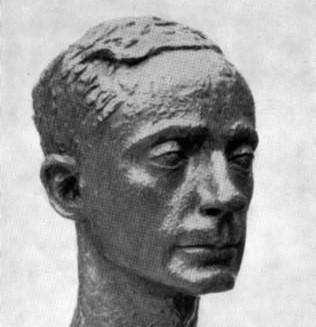
Edmond-Henri Crisinel (1897-1948)
Edmond-Henri Crisinel was Swiss and one of the influential chroniclers for the daily paper la Revue de Lausanne between the Wars. He was a faithful, close friend of many writers,... -
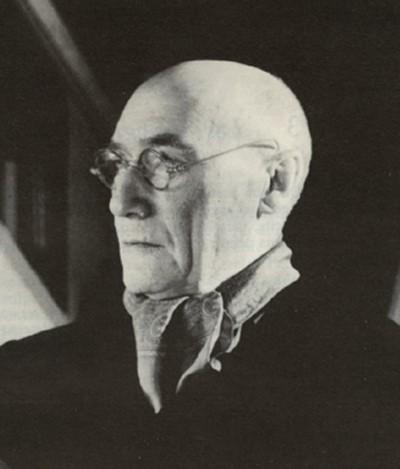
André Gide (1869-1951)
André Gide was one of the most well-known writers of the first half of the XXth century. He was born into a protestant family and was brought up in an... -

Pierre Loti (1850-1923)
Pierre Loti, whose real name was Julien Viaud, was a naval officer and a writer. His mother was a faithful follower of the reformed faith and she saw to it... -
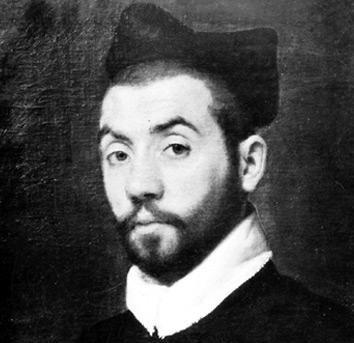
Clément Marot (1496-1544)
The famous 16th century French poet put into verse the biblical Psalms that were to be sung all over France and become the well-known Huguenot Psalter. -
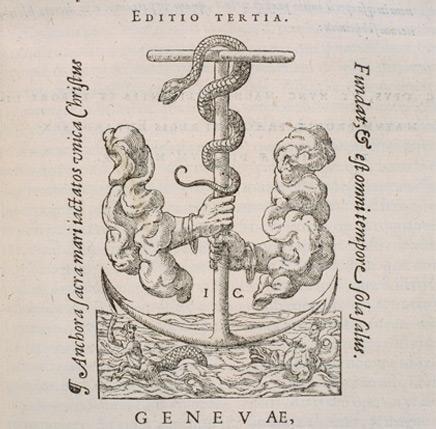
Jean Crespin (1520-1572)
Jean Crespin was a lawyer before becoming a well-known printer in Geneva, where he settled in 1548.

